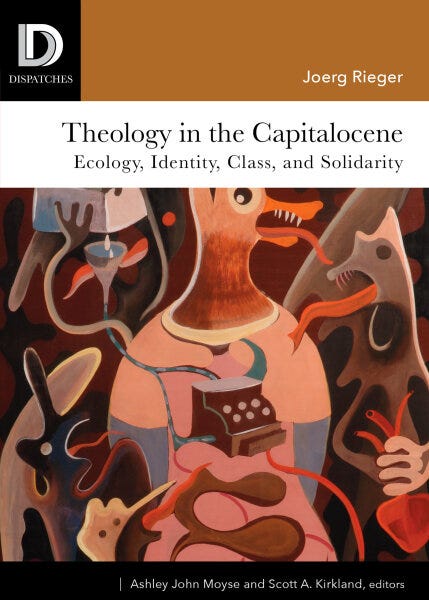Theology in the Capitalocene
A Book Review
In his newest book Theology in the Capitalocene, Joerg Rieger examines the impact capitalism and its intertwining with religion has had on our world. Rieger discusses the current thought that we are living in the Anthropocene as a geological epoch. The Natural History Museum in the U.K. introduces the Anthropocene:
“The word Anthropocene comes from the Greek terms for human (‘anthropo’) and new (‘cene’), but its definition is controversial. It was coined in the 1980s, then popularised in 2000 by atmospheric chemist Paul J Crutzen and diatom researcher Eugene F Stoermer. The duo suggested that we are living in a new geological epoch.” (NHM)
Rieger argues that rather than think of this epoch as the Anthropocene, we may want to consider this the Capitalocene in which Capitalism has driven the most human change upon the planet and societies. Rieger is a theologian who critiques and offers solutions to economic problems faced by humanity. Rieger critiques Capitalism directly without descending into the typical binary discussions of Capitalism versus another system. Throughout the book, Rieger draws from a diverse group of sources including the ecological, scientific, sociological, and various other critics such as Marx, socialist frameworks, and others. Rieger stresses that the most impactful way to reimagine economy is through solidarity with one another such that humanity finds ways to reduce production and gain agency over reproduction as well.
As a critic, Rieger discusses how class, race, power, and social engagement intersects and that the overall issue with capitalism theologically is not consumption, but the inevitable push for increased production and exploitation of human and nonhuman creation. Rieger describes how power is an aspect that we must examine to work theology in the Capitalocene. “Theology in the Capitalocene starts with an account of the dominant powers in order to identify alternatives, and it needs to be both local and global and always international, incorporating the intersections of human and nonhuman developments” (Joerg Rieger) The book argues persuasively that our current expression of Capitalism in the United States is especially informed by the original slave trade and slave economy of the early U.S. This can help us understand the particularities of the often harsh expressions of Capitalism in the U.S. and inform us how to better respond to that harshness.
Rieger contrasts his approach to critiquing Capitalism which may help in conversations around the how we may imagine a system other than the current primary system of our world. “I have argued that theological challenges to capitalism need to pay more attention to production because problems of consumption are directly tied to the capitalist need for growing economic production, typically mediated to consumers by the advertising industry (reproduction and reproductive labor are the condition of production but often not even mentioned because they are relegated to minoritized human and nonhuman labor” (Joerg Rieger) This approach may help to redirect the pushback from many when Capitalism is critiqued. As Rieger mentions in Jesus Vs. Caesar “”What does it say that many Christians can imagine the end of the world but not the end of capitalism?" (Jesus vs.)
This book does an excellent job of discussing the issues in our current economic systems with possible changes that can redirect our current trajectories. By examining how the various critiques and solutions to those critiques in Capitalism, Rieger shows us ways of doing theology that recaptures much of the momentum that many Christian groups were riding in the early twentieth century. It may be helpful for my own Holiness denomination to realize that we were once close, if not within, the Christian Left through our solidarity with the marginalized. This is a subject that Rieger touches on within the book in his discussion of the Christian Left.
Concluding the book, Rieger discusses solidarity and how that might lead to one action for Christians who wish to see a change in our world; reparations. Regardless of agreement with the arguments in the conclusion, Rieger presents a cogent and solidly Christian possibility of reparations to those of African descent whose ancestors were enslaved.
Theology in the Capitalocene is a good discussion of the academic and practical framework of how we can respond to the churn of resources, including human and non-human creation, in Christian solidarity. I recommend the book for anyone who is curious about these subjects.
NHM - https://www.nhm.ac.uk/discover/what-is-the-anthropocene.html#:~:text=The%20scale%20of%20human%20impact%20on%20Earth&text=The%20Anthropocene%20is%20sometimes%20used,on%20it%20has%20become%20clear.
Joerg Rieger, Theology in the Capitalocene: Ecology, Identity, Class, and Solidarity
Rieger, Joerg, Jesus vs. Caesar: For People Tired of Serving the Wrong God
I received a review copy of Theology in the Capitalocene, but no one has reviewed or asked for a review of my comments prior to publishing. These comments are completely my own thoughts on the book.
#theologyinthecapitalocene



